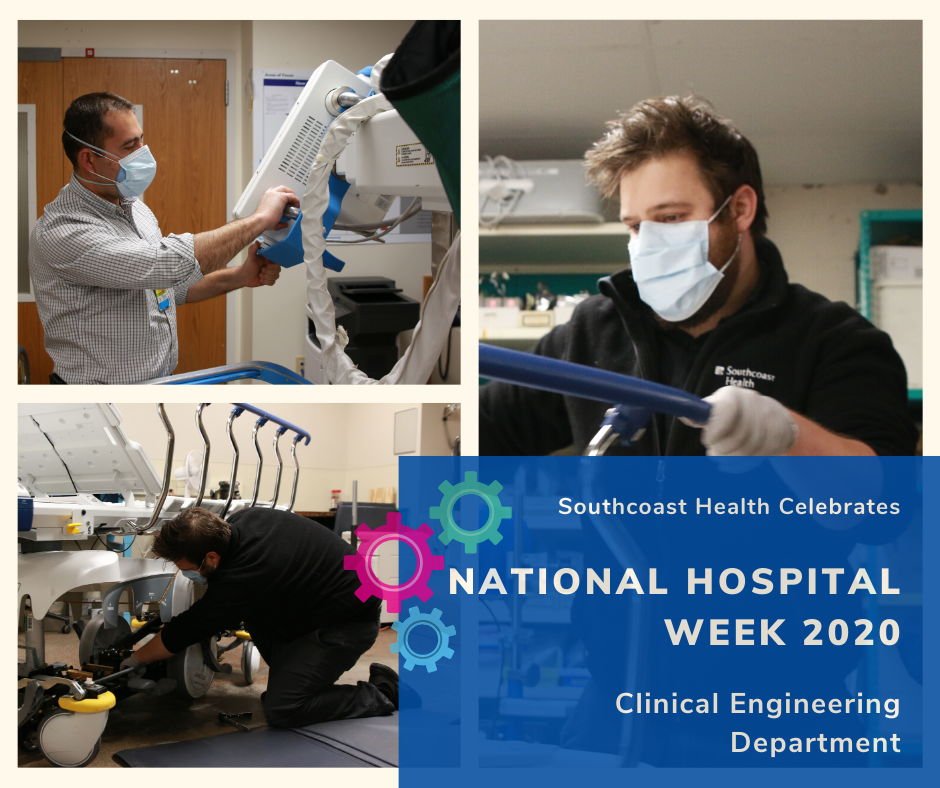Staff Profiles
National Hospital Week – Honoring Our Clinical Engineering Department

May 10-16, 2020, is National Hospital Week – Southcoast Health is taking this opportunity to acknowledge all of our dedicated departments. We’re incredibly proud of each member of our staff, and we recognize the vital role they play in our hospital systems and facilities, both behind the scenes and on the frontline.
If you ask the average hospital employee: What do the Clinical Engineering staff do? You might get a blank look. And that’s just the way Dan Bazinet prefers it.
Bazinet is the Director of Southcoast’s Clinical Engineering Department. He manages a department that oversees the installation, repair and maintenance of more than 21,000 pieces of medical equipment in over 100 locations in an area that spans nearly 900 square miles. “We’re everywhere,” he says. “From Hyannis on the Cape to Rhode Island, and many places in between Taunton, Wareham, Fairhaven, Dartmouth, Westport, and more.
The numerous kinds of equipment include beds, stretchers, IV infusion pumps, defibrillators, heart monitors, echocardiogram (EKG) machines, thermometers, nurse-call systems and ventilators to name just some. Taken together, there are thousands of pieces of equipment that Bazinet’s department is responsible for on a daily basis.
But Bazinet doesn’t want staff to think about Clinical Engineering.
“If people know who you are, then chances are it’s because they had to call you. And they’re calling because a piece of equipment isn’t working properly,” Bazinet says. “We strive for 100 percent reliability. We want staff to be surprised if a piece of equipment doesn’t work, for them not to give a second thought about whether they can rely on needed equipment. People take medical equipment for granted, and that’s the way we like it.”
Nevertheless, Bazinet finds himself having to explain what he and his department do. “My kids got it a long time ago,” he says. With close to 36 years working in the field, he recalls watching St. Elsewhere (a 1980s medical drama television series set in Boston) and saying to my kids, “Do you see all that equipment around the hospital bed? That’s what I take care of.”
The work couldn’t be done without the frontline staff in the department. In addition to Bazinet, the department is comprised of a manager, Neil Piazza, two Site Operations Coordinators who manage real-time changing needs and priorities, Jorge Dias and Janet Macedo, two electro-mechanical service technicians and 10 additional biomedical technicians. For the last seven years, they’ve also had an intern from Bristol Community College working one or two days a week for credit.
The staff are based at Charlton Memorial and St. Luke’s, but the techs spend most of their time in the field. The Charlton Memorial group handles mainly south and west of Fall River, and the St. Luke’s group handles east, all the way to Hyannis. “None of us are working from home because our work is where the equipment is being used,” Bazinet says. The department operates from 7 am to 4:30 pm and is on call 24/7.
As immense and challenging as the work typically is, the COVID-19 pandemic has made it more so. “Getting additional medical equipment to prepare for a surge has been a challenge,” Bazinet says. “In part because of New York (where there’s been a huge number of cases), medical equipment has been in short supply.”
And even when equipment is available, it’s not simply a matter of buying it. Bazinet says Southcoast is “smart and strategic.” There are many factors that go into purchasing and leasing equipment: cost, value, future use.
“For the hospital surge, Southcoast bought previously used beds in fair condition for a fraction of the usual cost. These are beds that won’t be needed long-term, so we didn’t want to pay top dollar. For the field hospital at UMass Dartmouth, we purchased new Vital Signs Monitors that will fill a need in SPG after COVID subsides. Managing medical equipment requires constant vigilance. We’re always up against equipment age, changing technology and limited funds,” he says.
COVID-19 has brought operational challenges as well. “The past two months have been pretty much a blur. There’ve been many long and stressful days, making sure everything needed is in place, and working,” says Janet Macedo. “We’ve had a massive influx of ventilators and other equipment. All of it needs to be set up and checked out.”
Southcoast had just one week to procure and set up the equipment needed at the field hospital. The Clinical Engineering staff also recently set up the equipment for the new labor and delivery rooms and the new ICU at St. Luke’s. “We did a lot of outside the box thinking to equip these new areas,” Macedo says.
Both Bazinet and Macedo cite the terrific Clinical Engineering staff when reflecting on the department’s work. “I am always proud of my amazing team and what they can accomplish, but particularly now during these trying times when I witness such selfless dedication every day,” Macedo says. “And I can’t say enough about the staff in the other departments we work with. They’re so helpful.”
“We have very high-quality technical talent. Mostly all long-term employees with great backgrounds and training, like Neil Piazza who was trained in the Air Force, but also very talented short-tenured employees who are beginning to make their mark in Clinical Engineering as well. They are all very good at what they do,” Bazinet says.
“They are very resourceful. We have the type of staff that approach problems and challenges with the mindset: ‘Let me see how I can figure that out.’ They are the ones who ensure our equipment is reliable. I’m often in awe of them.”
